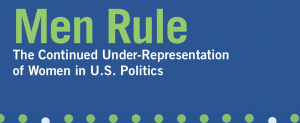Why Women Still Won’t Run for Office
January 19, 2012
 By Kathy Groob, Publisher of ElectWomen Magazine and Author of Pink Politics
By Kathy Groob, Publisher of ElectWomen Magazine and Author of Pink Politics
With just 17% of the members of Congress representing the female gender, the United States has a systemic problem—there aren’t enough women serving in elected office. More than 50 countries rank higher than the United States in women’s elected representation; we come in at 91st place.
Universities, organizations and individual foundations such as The Barbara Lee Family Foundation have spent thousands of dollars and beaucoup hours studying the reasons why the United States just can’t seem to make significant progress with getting women to run for office.
“Gender gap in political ambition is virtually the same as it was a decade ago.” Lawless & Fox, 2012

Jennifer Lawless
Associate Professor of Government at American University, Jennifer Lawless and her partner, Richard Fox of Loyola Marymount University have published a new report that concludes “when women run for office, regardless of the position they seek, they are just as likely as their male counterparts to win their races.”
So what’s the problem?
Lawless and Fox contend, “The fundamental reason for women’s under representation is that they do not run office. There is a substantial gender gap in political ambition; men tend to have it, and women don’t.”
In their 2012 report, “Men Rule”, Lawless and Fox outline seven (7) reasons women continue to be under-represented in the political theater:
- Women are substantially more likely than men to perceive the electoral environment as highly competitive and biased against female candidates.
- Hillary Clinton and Sarah Palin’s candidacies aggravated women’s perceptions of gender bias in the electoral arena.
- Women are much less likely than men to think they are qualified to run for office.
- Female potential candidates are less competitive, less confidant, and more risk averse than their male counterparts.
- Women react more negatively than men to many aspects of modern campaigns.
- Women are less likely than men to receive the suggestion to run for office- from anyone.
- Women are still responsible for the majority of childcare and household tasks.
In the Barbara Lee Family Foundation’s 2011 report titled, Turning Point, 2010 elections were described as a turning point for women candidates. The report states that gender disadvantages faded and that in fact, being a woman can be a strategic asset when running for executive office.
Here’s hoping that 2012 will indeed be the year of the woman and that more women than ever will hear the calling and step up to run for office.
For more information on the Lawless & Fox report, Men Rule, click the link: http://www.american.edu/spa/wpi/upload/2012-Men-Rule-Report-web.pdf
For access to the Barbara Lee Family Foundation report, Turning Point, click the link: http://www.barbaraleefoundation.org/our-research/topics/turning-point-2010
Kathy Groob is the founder and publisher of ElectWomen Magazine, served as an elected official on city council before running for the Kentucky Senate. She is also the author of Pink Politics – The Woman’s Practical Guide to Winning Elections.
